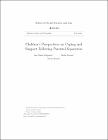| dc.contributor.author | GREENE, SHEILA MARY | |
| dc.contributor.author | HOGAN, DIANE | |
| dc.date.accessioned | 2010-05-13T11:29:50Z | |
| dc.date.available | 2010-05-13T11:29:50Z | |
| dc.date.issued | 2008 | |
| dc.date.submitted | 2008 | en |
| dc.identifier.citation | Halpenny. A. M., Greene, S. & Hogan, D., Children s perception of coping and support following parental separation, Child Care in Practice, 14, 3, 2008, 311-325 | en |
| dc.identifier.other | Y | |
| dc.identifier.uri | http://hdl.handle.net/2262/39507 | |
| dc.description | PUBLISHED | en |
| dc.description.abstract | Families represent the primary setting in which most children's lives are shaped and determined. Increasingly, children experience ongoing change in family formation and structure, and such fluctuation may threaten or diminish their feelings of security with regard to established family roles, relationships and routines. A number of studies have explored available support for children in the context of family transition, focusing in particular upon those organisations providing services to children and families. However, in order to gain more precise insight into the mechanisms through which children can best be supported, it is necessary to consult children themselves and to elicit their perspectives and responses to the changes in their family contexts. A primary aim of the present study, therefore, is to gain an understanding of children's strategies for coping with parental separation, and the sources of support that they find most helpful in order to adjust to these changes. The present study was carried out in the Republic of Ireland. Central to the framework of the study is the view that children are competent in expressing their perceptions and feelings regarding their relationships with their parents post-separation. Sixty children, in two age groups (8-11 years old, representing middle childhood, and 14-17 years old, representing adolescence) participated in the study. A qualitative approach was adopted with semi-structured interviews exploring children's perspectives on the role played by different types of support, both informal (family, friends) and formal (counselling/peer support services, school). Key findings in the present study highlight the importance for children of being selective about whom they seek and accept support from, with the family being the preferred source of support for the majority of children. The study also highlights the need to provide a broad range of services in outside agencies in a non-stigmatising way and at various stages throughout the separation process. | en |
| dc.format.extent | 311-325 | en |
| dc.language.iso | en | en |
| dc.publisher | Taylor and Francis | en |
| dc.relation.ispartofseries | Child Care in Practice; | |
| dc.relation.ispartofseries | 14; | |
| dc.relation.ispartofseries | 3; | |
| dc.rights | Y | en |
| dc.subject | Psychology | |
| dc.title | Children s perception of coping and support following parental separation | en |
| dc.type | Journal Article | en |
| dc.type.supercollection | scholarly_publications | en |
| dc.type.supercollection | refereed_publications | en |
| dc.identifier.peoplefinderurl | http://people.tcd.ie/sgreene | |
| dc.identifier.peoplefinderurl | http://people.tcd.ie/dmhogan | |
| dc.identifier.rssinternalid | 66616 | |
| dc.identifier.rssuri | http://arrow.dit.ie/aaschsslarts/21/ | en |




